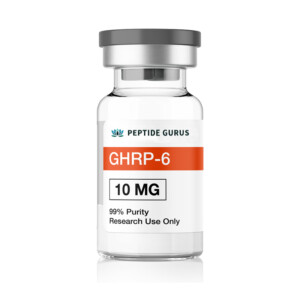In the ever – evolving landscape of medical research, peptides have emerged as potential powerhouses for various health benefits. One such peptide that has caught the attention of researchers is GHRP – 6. This article delves into the fascinating world of GHRP – 6 peptide and its remarkable role in heart protection, while also keeping an eye on the latest FDA guidelines.
Understanding GHRP – 6 Peptide
Growth Hormone – Releasing Peptide – 6 (GHRP – 6) is a synthetic hexapeptide, composed of six amino acids. It acts as an agonist of the ghrelin receptor. Ghrelin, often referred to as the “hunger hormone,” is involved in multiple biological processes, including metabolism, appetite regulation, and growth hormone release. By binding to the ghrelin receptor, GHRP – 6 stimulates the natural release of growth hormone from the anterior pituitary gland. This action sets off a cascade of beneficial effects throughout the body.
The Link Between GHRP – 6 and Heart Protection
Prevention of Oxidative Stress
Oxidative stress is a major culprit in causing damage to heart muscle cells. Free radicals, which are highly reactive molecules, can cause oxidative damage to lipids, proteins, and DNA within the cardiac cells. GHRP – 6 has been shown to reduce oxidative cytotoxicity. It shields cardiac cells from the harmful effects of free radicals, thereby reducing the risk of heart failure under oxidative stress conditions. In animal models, GHRP – 6 treatment has been associated with a decrease in reactive oxygen species (ROS), which are key mediators of oxidative stress. This reduction in ROS levels helps maintain the integrity of the heart cells and their proper functioning.
Cardiac Cell Protection and Regeneration
In addition to protecting against oxidative stress, GHRP – 6 plays a crucial role in cardiac cell protection and regeneration. It enhances the survival of myocardial cells. In cases of heart damage, such as after a heart attack (myocardial infarction), the ability of the heart to repair itself is limited. However, GHRP – 6 has been demonstrated to support the repair of damaged cardiac tissue. It promotes processes like angiogenesis (the growth of new blood vessels) in the heart. New blood vessels are essential for delivering oxygen and nutrients to the damaged heart tissue, facilitating the healing process. This property of GHRP – 6 makes it a promising candidate for improving cardiac function in patients with heart diseases.
Influence on Cardiovascular System
GHRP – 6 also contributes to overall cardiovascular system protection. It may help in maintaining proper blood vessel function. By interacting with certain receptors in the blood vessels, it can influence vasodilation and vasoconstriction, ensuring an appropriate blood flow to the heart and other organs. This balanced blood flow is essential for optimal heart function and reducing the workload on the heart.
Adherence to FDA Guidelines
When considering the use of GHRP – 6, it’s important to note that as of now, it is mainly used in pre – clinical research settings. The FDA has strict guidelines regarding the use of peptides for human consumption. Peptides intended for medical use must go through rigorous testing in clinical trials to prove their safety and efficacy. Although the research on GHRP – 6 and its heart – protective properties is promising, it has not yet received FDA approval for direct human use in treating heart conditions. However, the pre – clinical data serves as a foundation for future research that may potentially lead to the development of new therapeutic strategies for heart diseases, following the FDA’s regulatory pathway.
Frequently Asked Questions
Can I take GHRP – 6 peptide to prevent heart disease?
As of now, GHRP – 6 is not approved for human use to prevent heart disease. It is still in the research stage, and more studies are needed to determine its safety and effectiveness for this purpose. It should only be used under the supervision of a qualified researcher in a proper research setting.
What are the potential side effects of GHRP – 6 related to the heart?
Since GHRP – 6 is not widely used in humans, the full spectrum of its side effects is not completely known. However, in animal studies, no direct negative cardiac side effects have been reported. But it’s important to note that extrapolating from animal data to humans is not always straightforward. If it were to be used in humans in the future, close monitoring would be required to detect any potential side effects on the heart or other organs.
How does GHRP – 6 compare to other medications for heart protection?
Currently, there are established medications for heart protection, such as statins for cholesterol management and beta – blockers for controlling blood pressure and heart rate. GHRP – 6 is in a different category as it works through a unique mechanism of action related to growth hormone release and its subsequent effects on cardiac cells. While the traditional medications have been well – studied and proven effective in clinical practice, GHRP – 6 shows potential in areas like cardiac cell regeneration, which some existing medications may not address as directly. But again, it cannot be used as an alternative to approved heart medications at present due to its unapproved status for human use.
